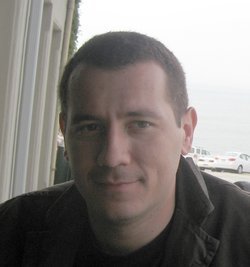Roberto Bonasio
2011 Regional Award Finalist — Post-Doc

Current Position:
Assistant Professor of Cell and Developmental Biology
Institution:
Perelman School of Medicine at the University of Pennsylvania
Discipline:
Biochemistry & Structural Biology
Areas of Research Interest and Expertise: Molecular mechanisms of epigenetic memory, genomics, chromatin biochemistry noncoding RNAs, social insects, noncoding RNAs
Biography:
- PhD, Immunology, Harvard Medical School
- MS, Biotechnology, University of Milan
In his lab at the University of Pennsylvania Roberto Bonasio studies the molecular mechanisms of epigenetic memory, which are key to a number of biological processes, including embryonic development, cancer, stem cell pluripotency, and brain function.
Epigenetics allows the inheritance of variation (phenotype) without changes in the DNA sequence (genotype). The fact that pluripotent embryonic stem cells, all sharing the same genome, differentiate into hundreds of cell types implies that information about cellular identity and transcriptional states must be stored somewhere within the cell but not in the primary DNA sequence. It has become apparent that this epigenetic information can be encoded in molecular signatures associated with chromatin, the complex of DNA, RNA, and proteins that packages the genome within the eukaryotic nucleus. These signatures include DNA methylation, histone “marks” and variants, higher-order chromatin structures, and chromatin-associated noncoding RNAs.
Several chromatin-associated protein complexes bind to noncoding RNAs and these interactions are essential for their proper recruitment and assembly on chromatin. However, many questions on how noncoding RNAs regulate epigenetic processes at the molecular, cellular, and organismal level remain unanswered.
Dr. Bonasio and his lab approach these fundamental biological questions from both a mechanistic and a systems-level perspective. They combine traditional biochemistry and molecular biology with genome-wide approaches and computational biology and study both conventional systems (mammalian cells) and nonconventional model organisms, such as ants, which offer new, unexplored avenues to study epigenetics.
"My long-term goal is to understand how epigenetic pathways naturally shape the output of a single genome so that one day we will be able to control them to program cells with desired differentiation states or functions and utilize them for medical and biotechnological applications."
Key Publications:
- Bonasio R, Lecona E, Narendra V, Voigt P, Parisi F, Kluger Y, Reinberg D. Interactions with RNA direct SCML2 to chromatin where it represses PRC1 target genes. eLife. 2014
- Bonasio R, Tu S, Reinberg D. Molecular signals of epigenetic states. Science. 2010
- Bonasio R, Zhang G, Ye C, Mutti NS, Fang X, Qin N, Donahue G, Yang P, Li Q, Li C, Zhang P, Huang Z, Berger SL, Reinberg D, Wang J, Liebig J. Genomic comparison of the ants Camponotus floridanus and Harpegnathos saltator. Science. 2010
Other Honors:
2015 Searle Scholar
2014 New Innovator Award from the National Institutes of Health (NIH)
2012 Helen L. and Martin S. Kimmel Senior Postdoctoral Fellowship in Stem Cell Biology
2008 Helen Hay Whitney Foundation Postdoctoral Fellowship
ROBERTO BONASIO’ WEBSITE
